Initiatives in 2024
On November 25, 2024, Osaka Prefectural Joto Technology High School held an online exchange event with El Araby High School in Egypt, marking the fourth year of the exchange program. This project aims to improve the quality of monozukuri (manufacturing) education in Egypt and Japan and promote mutual understanding through mutual learning by the teachers and student-to-student interaction between the two schools.
Before each exchange session, Joto students try to deepen their understanding of Middle Eastern culture and Japan’s international role. On this occasion, they invited two guest speakers to give talks: Mr. Tomio Isogai, Vice President of the Kansai Japan India Cultural Society and former corporate expatriate with many years’ experience working overseas, and Mr. Keigo Hara, a teacher at Mitake Elementary School (Mitake-cho, in Gifu Prefecture) who previously taught at Cairo Japanese School in Egypt. They spoke at length about Japan’s position in the international community and the characteristics of Japanese technology and culture, as well as about the history, culture and daily life in Egypt. Both speakers became interested in the school’s exchange activities through the EDU-Port website and secretariat, leading to their cooperation with Joto High School.
Talk by Mr. Isogai: “Japan in the World”
Mr. Isogai’s extensive experience and current role as Vice President of the Kansai Japan India Cultural Society were not only very informative for students getting ready to join the workforce, but also very meaningful when considering the school’s exchange program with Egypt from the perspective of “Japan in the world”.
In the talk, students first learned that religion is a very important theme for people all over the world. In Japan, there are few opportunities to talk about religion, but understanding Islam, one of the three major religions, is particularly essential for anyone hoping to work on the international stage.
The students also learned how the meticulousness of Japanese craftsmanship has borne outstanding results in manufacturing processes, earning Japan global trust as a result. Using origami as a concrete example, Mr. Isogai explained that the key to creating a beautiful origami piece is to perform each complex step with accuracy. As a practical application, a number of students participated in a hands-on origami folding exercise, experiencing firsthand the importance of both individual work and teamwork. Through this exercise, they also learned that while the Japanese are very good at working in a group, many people around the world have difficulty working collaboratively.
-
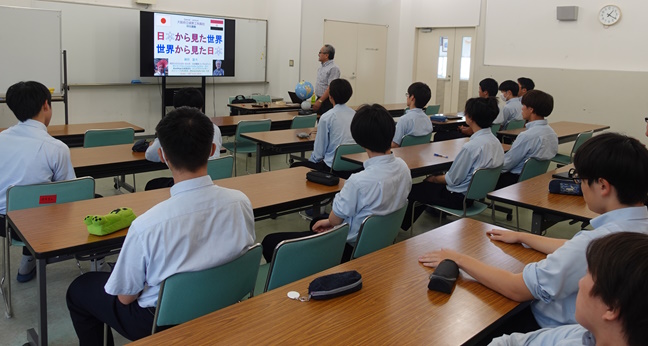 Talk on “Japan in the World”
Talk on “Japan in the World” -
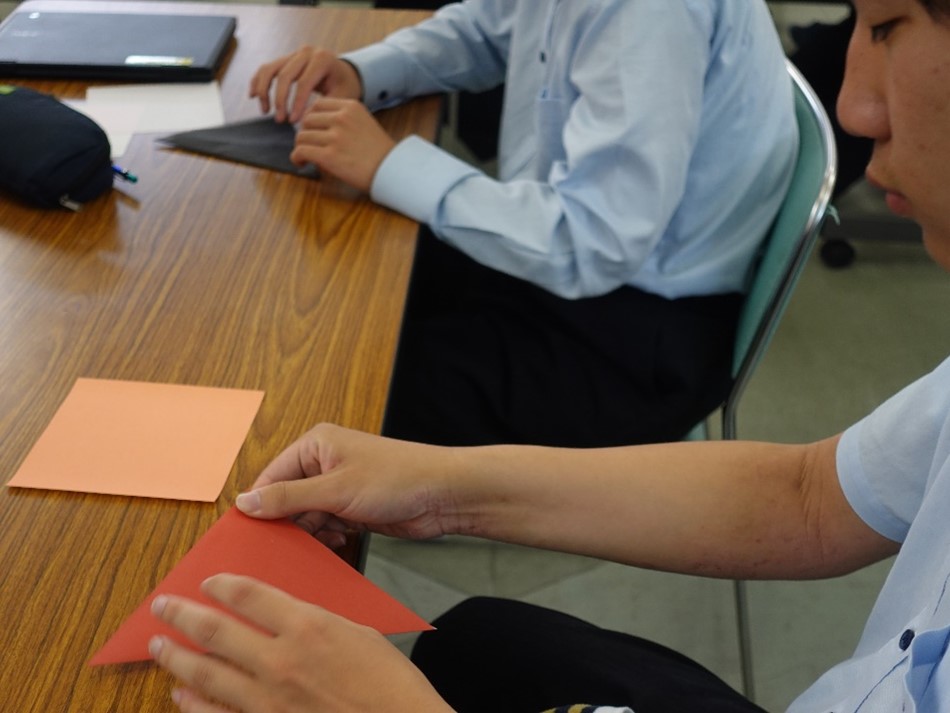 Learning the spirit of monozukuri craftsmanship through origami
Learning the spirit of monozukuri craftsmanship through origami
Talk by Mr. Hara: “Egypt Through the Eyes of a Japanese”
Mr. Hara was invited to give a talk on Egyptian culture and customs and his impressions of Egypt as a Japanese. Unlike previous occasions when the students learned about Egypt’s history and culture from Egyptian speakers, this time a new approach to learning about Egypt from the perspective of a Japanese was adopted. The students asked so many questions during the Q&A session that they ran out of time, but they were able to further deepen their interest in and understanding of Egypt.
-
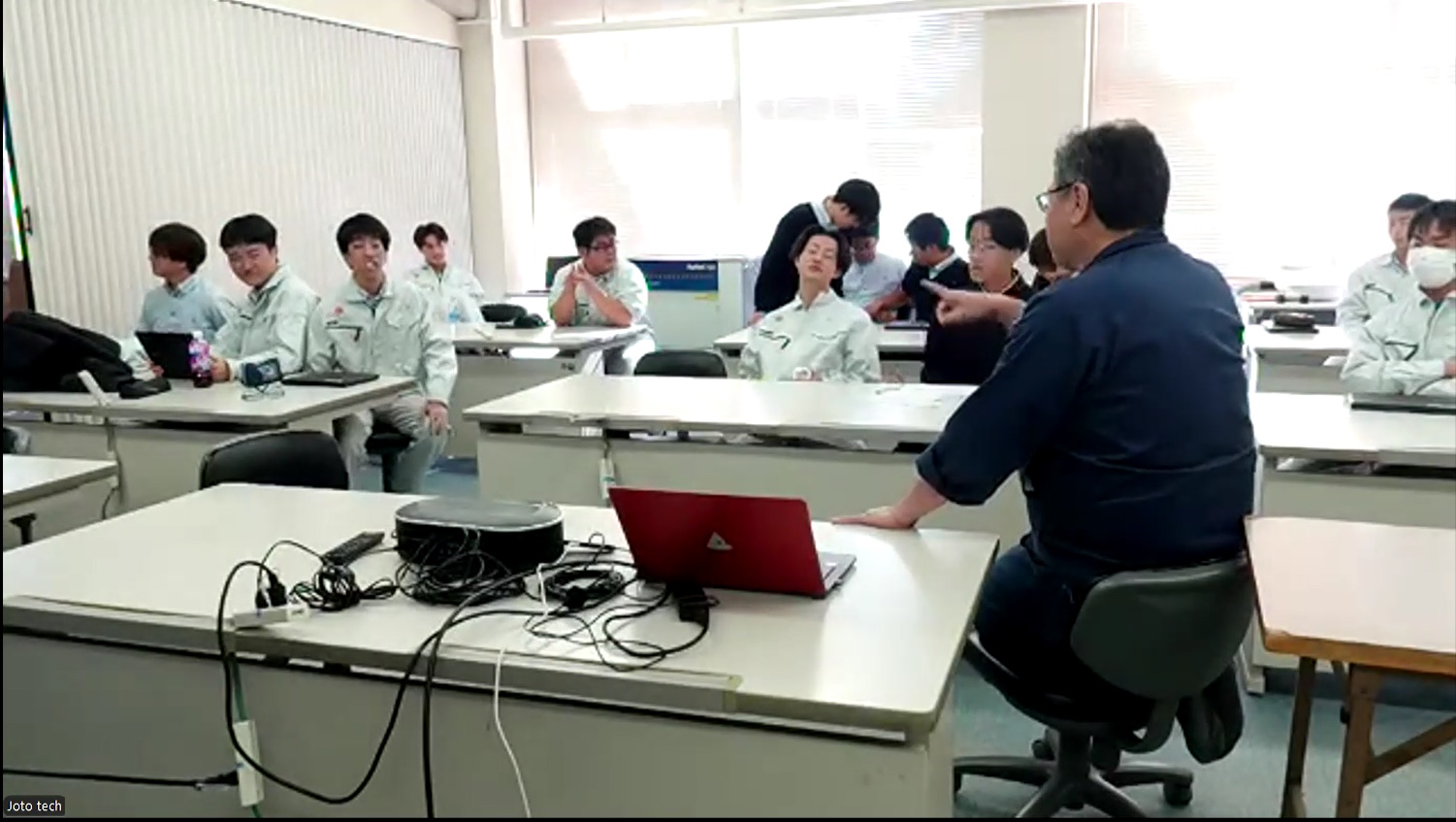 Talk on “Egypt Through the Eyes of a Japanese”
Talk on “Egypt Through the Eyes of a Japanese” -
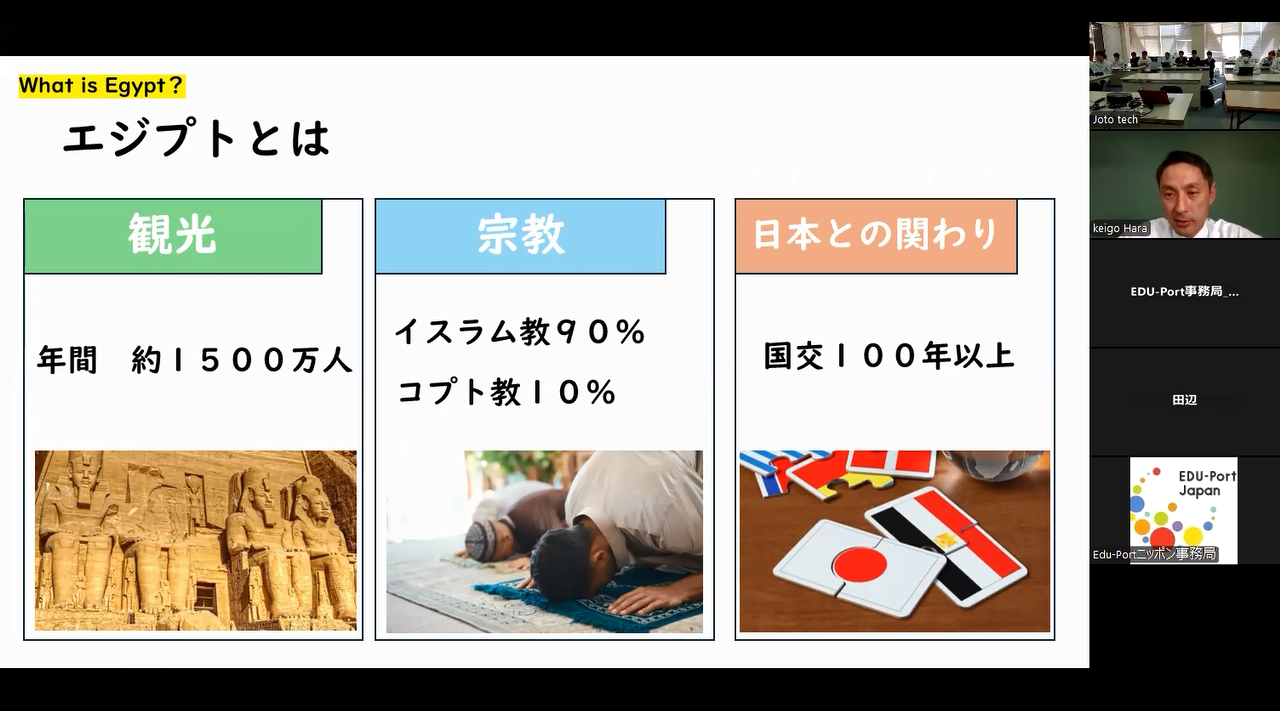 Talk on “Egypt Through the Eyes of a Japanese”
Talk on “Egypt Through the Eyes of a Japanese”
Teacher-to-Teacher Interaction
Through the exchange activities to date, teachers from the two schools have deepened their understanding of each other’s challenges and initiatives. They have also shared knowledge about the differences in technical education between Egypt and Japan, exchanging concrete opinions about teaching materials and practical training methods.
In this context, they discussed conducting a lesson study to learn more about how actual lessons are taught in each other’s schools. However, since observing classes in real time was out of the question due to the time difference, from 2023 onwards they have been recording lessons and then sharing and discussing the videos. This approach has enabled them to share specific, easy-to-understand information, leading to more in-depth discussions.
-
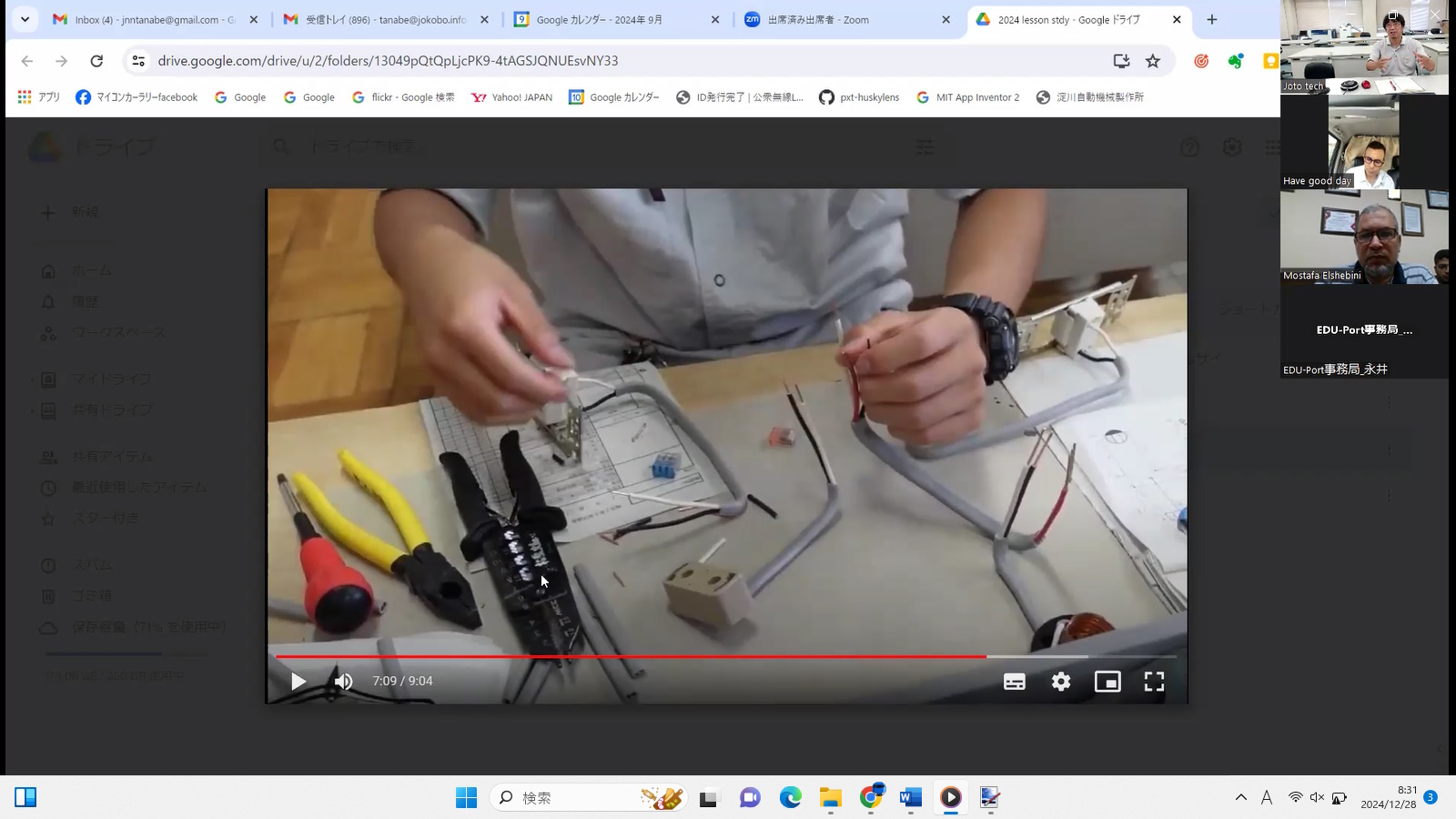 Practical training in electrical installation work at Joto Technology High School
Practical training in electrical installation work at Joto Technology High School -
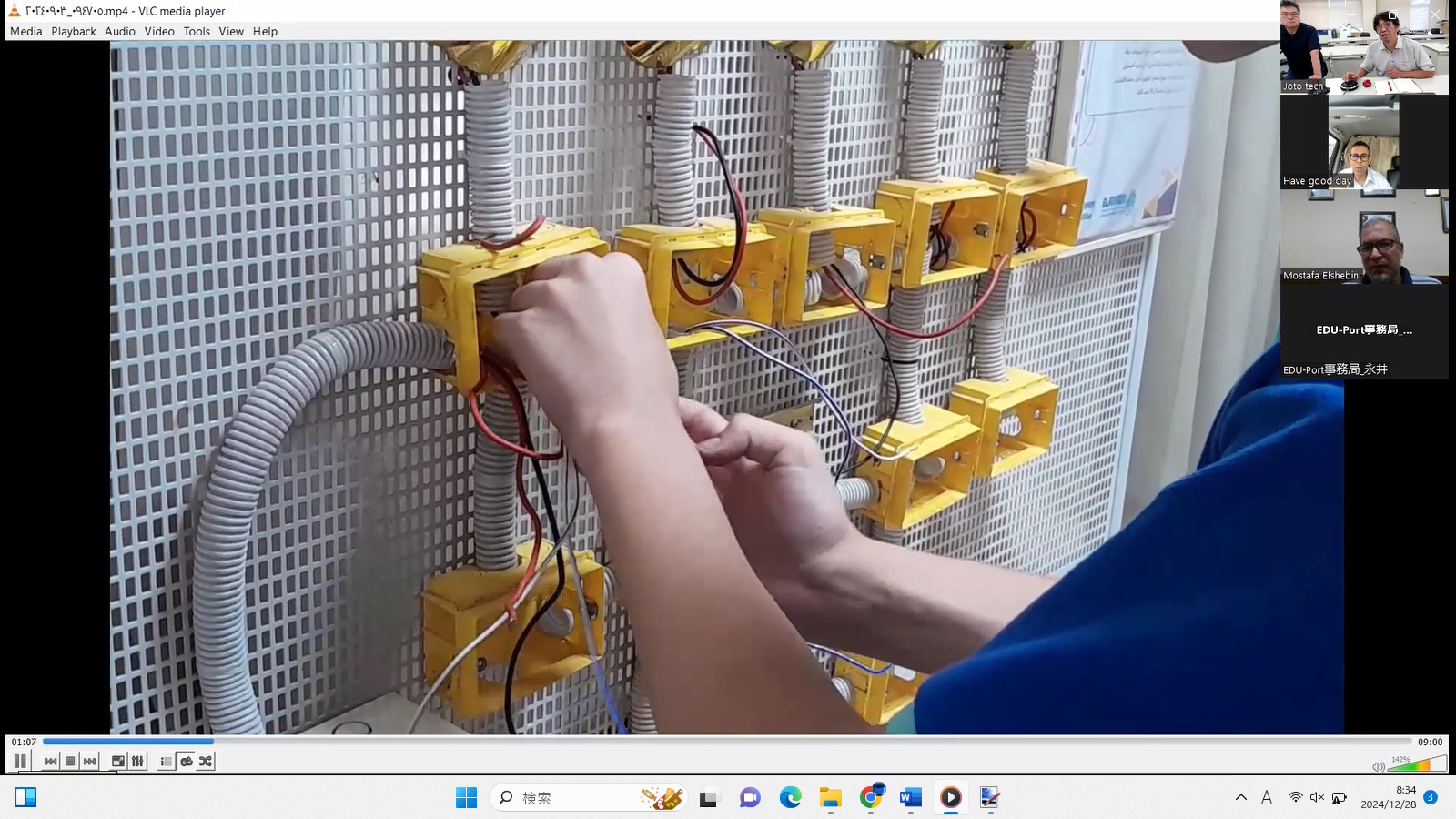 Practical training in electrical wiring at El Araby High School
Practical training in electrical wiring at El Araby High School
Student-to-Student Interaction
Following discussions with El Araby High School, it was decided that Joto Technology High School would moderate the event. Initially, there were times when internet connection problems delayed the start of their exchanges, but now the students are more familiar with the process, and this time the event started smoothly under Joto’s moderation.
The first presentation came from the third-year students at Joto Technology High School who introduced their AI Janken (Rock-Paper-Scissors) Robot, created as this year’s research project. The robot uses a camera to learn the hand shapes for rock, scissors and paper, and through AI image recognition, it instantly determines the winning hand. However, the students had not completed the connection between the recognition system and the robot’s hand movement parts in time, and this was explained as a future challenge.
Before the event, Joto students did some research and discovered that Japanese Janken (rock-paper-scissors game) is not commonly known in Egypt. So, they first of all prepared a slide explaining the rules of Japanese Janken that the Egyptian students were quick to grasp, and they were able to play Janken together online. This turned out to be even more exciting than expected and the atmosphere was just like that of an international Janken tournament, breaking down barriers and bringing the students much closer to each other.
Following the detailed explanation of Joto’s AI Janken Robot, the El Araby students gave a presentation on a water dispenser and automatic vacuum cleaner that they had made in class. For the water dispenser, they achieved approximately 48% energy savings by replacing the components’ motors from a factory with high-performance ones. The automatic vacuum cleaner was designed to be charged by solar panel. After the presentation, there was a lively Q&A session with Joto students asking questions about the kind of sensors that were used, the microcontroller board that was used, the development environment, the programming language, and so on. The presentations by the students of both schools were highly informative and there was a lively exchange of ideas, making it a significant learning experience not only from a technical perspective but also from a cultural one.
-
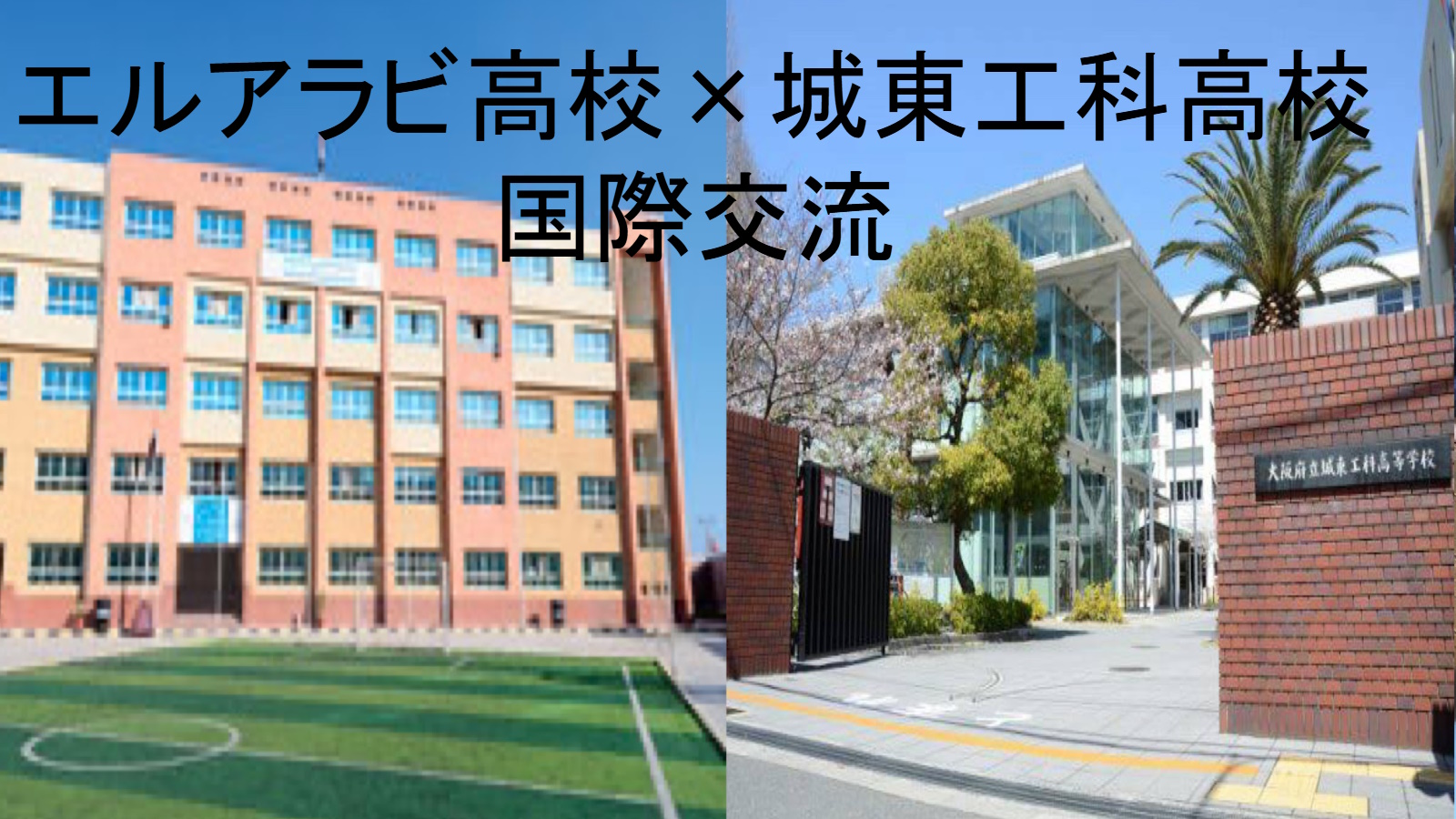 Opening of the interaction event
Opening of the interaction event -
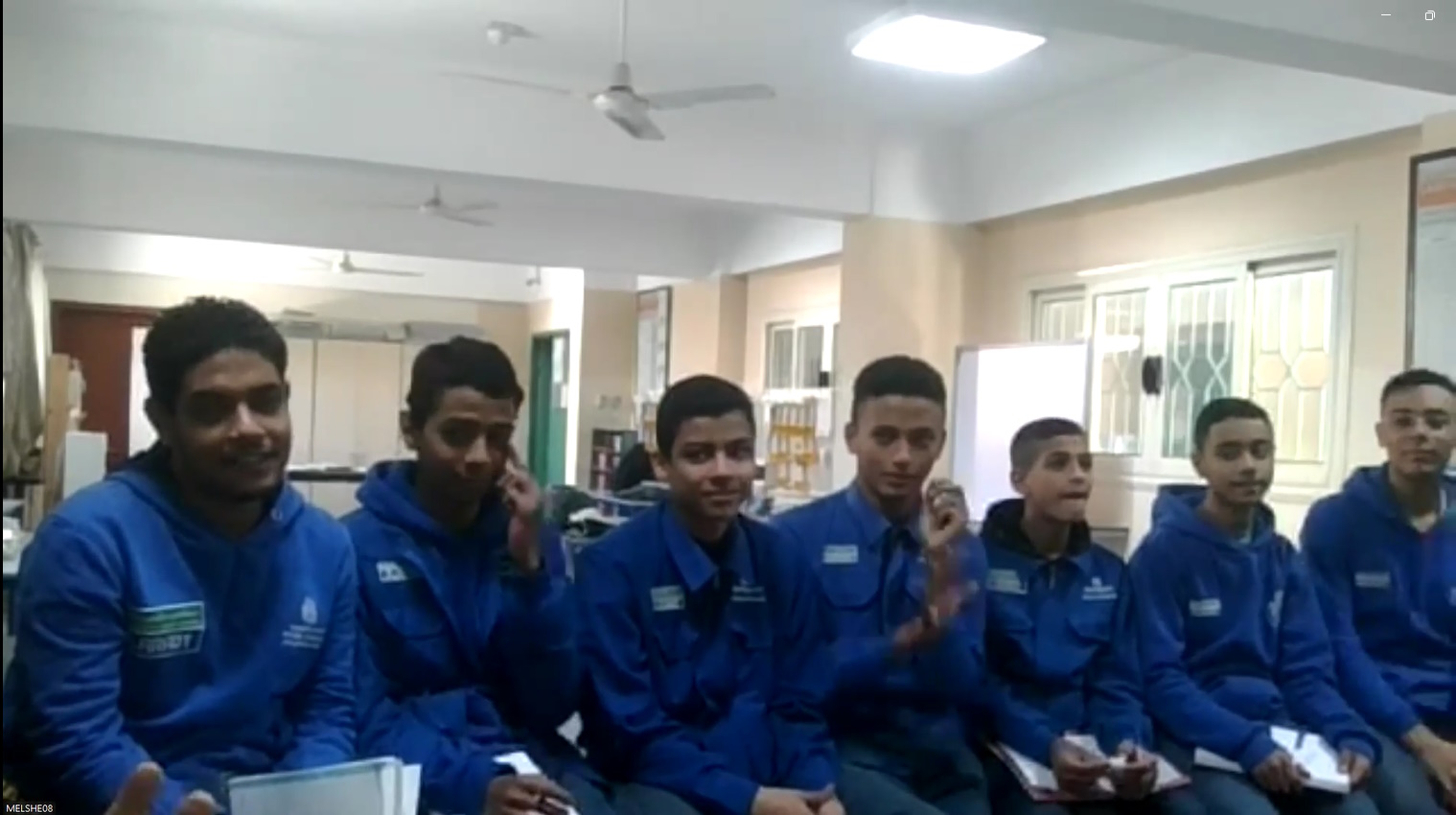 El Araby High School students
El Araby High School students
-
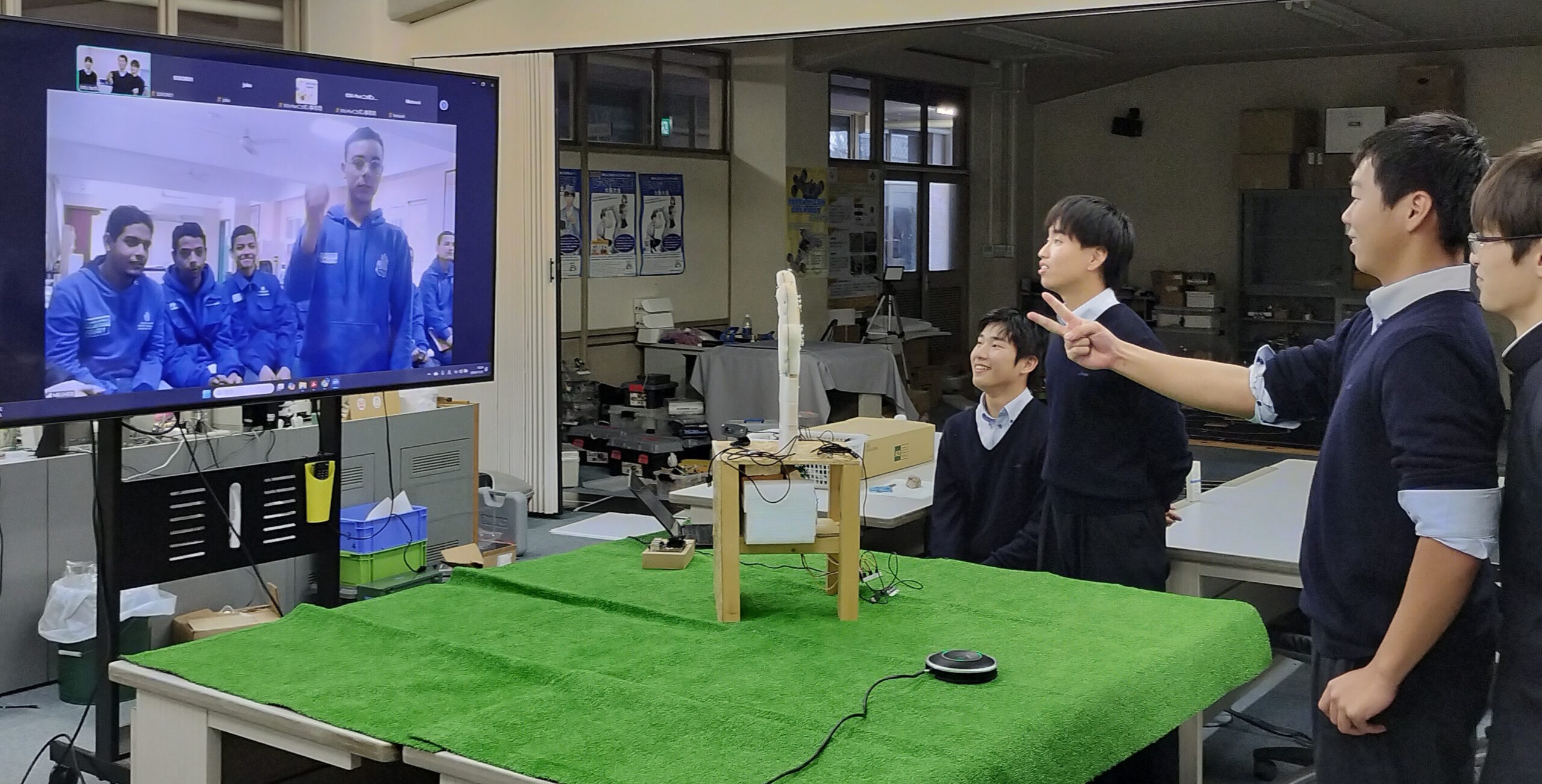 Joto student plays a losing hand in the online Janken game
Joto student plays a losing hand in the online Janken game -
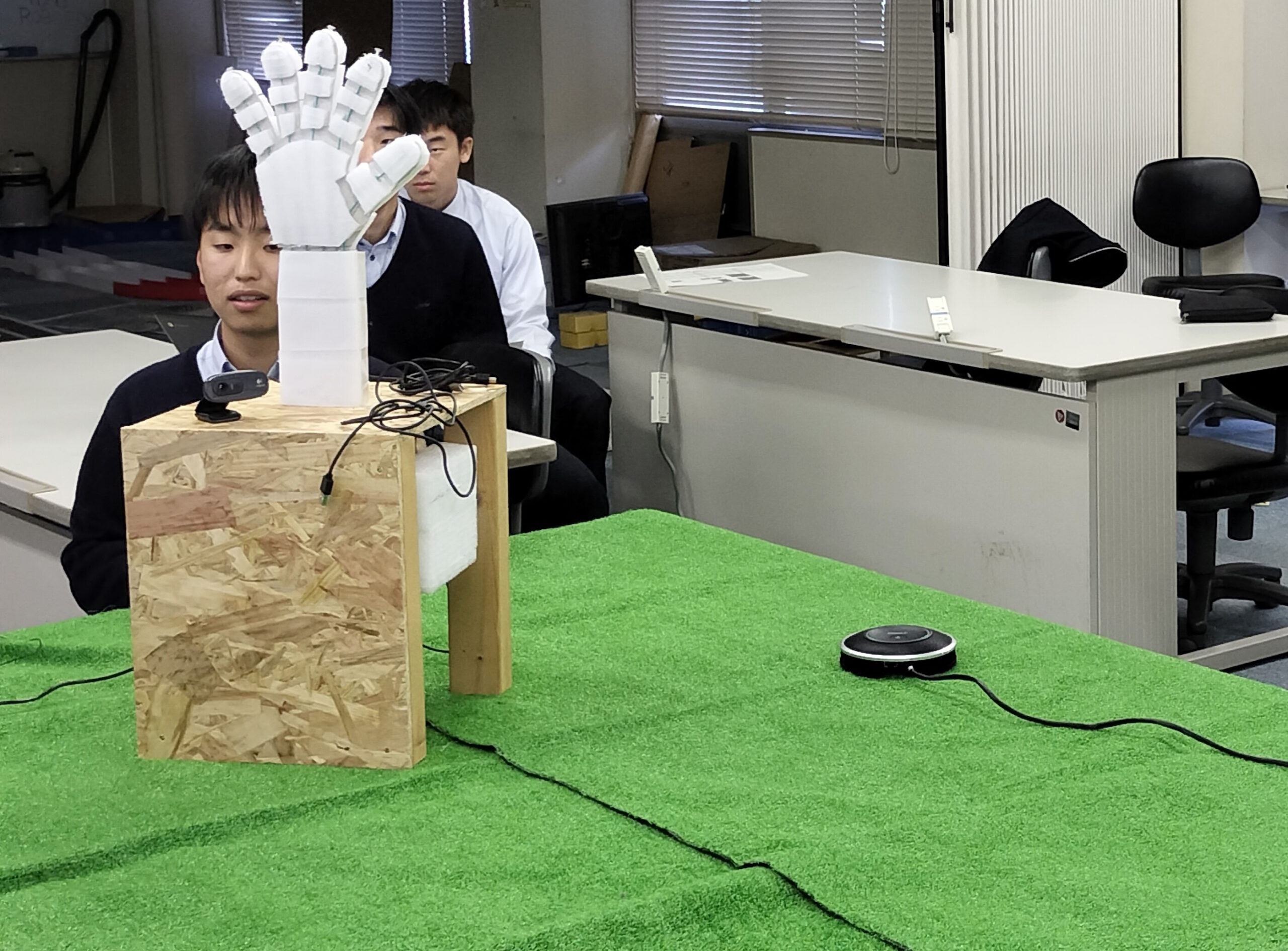 Explaining the AI Janken Robot (Joto)
Explaining the AI Janken Robot (Joto)
-
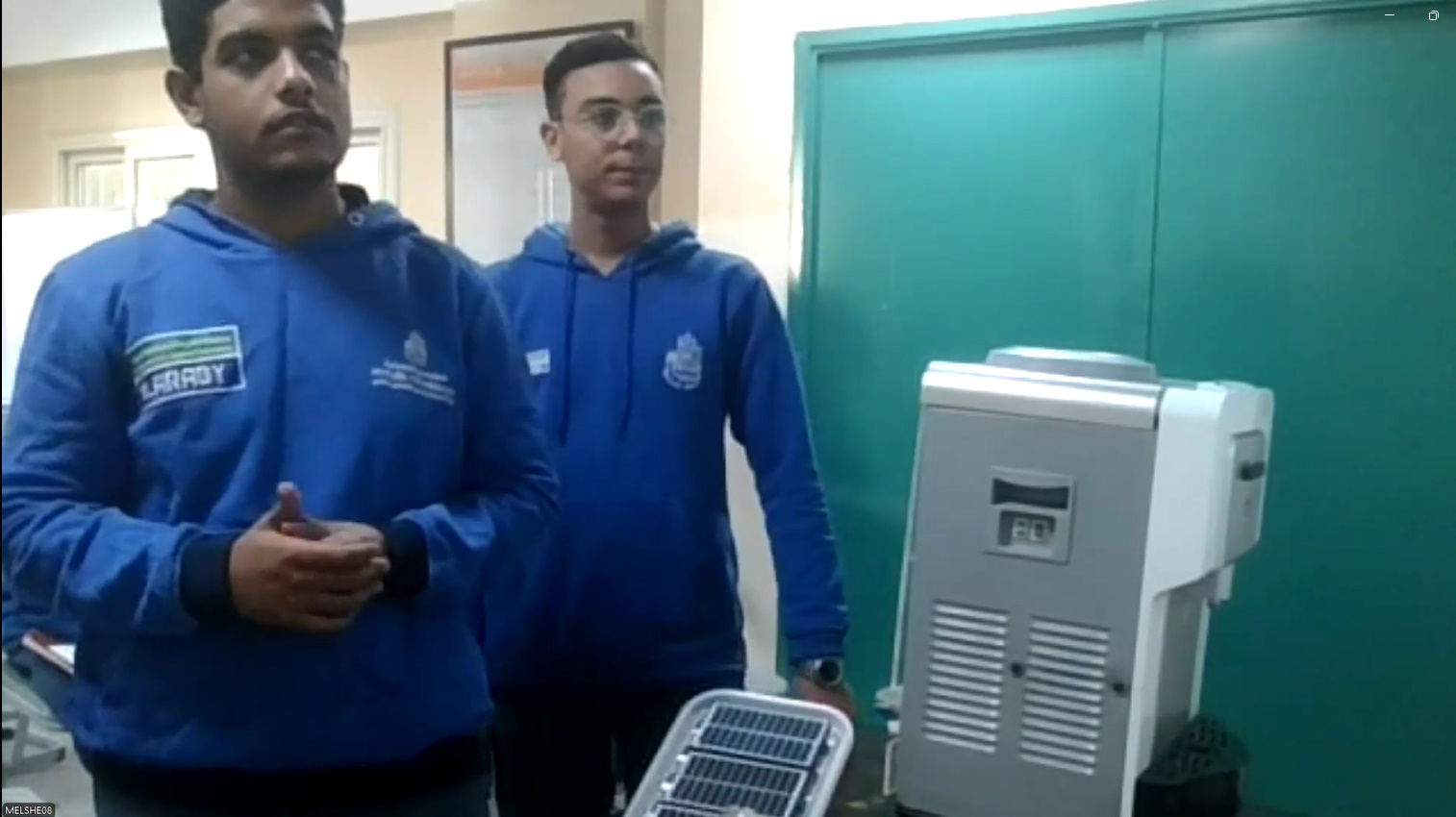 Explaining the automatic water dispenser (El Araby)
Explaining the automatic water dispenser (El Araby) -
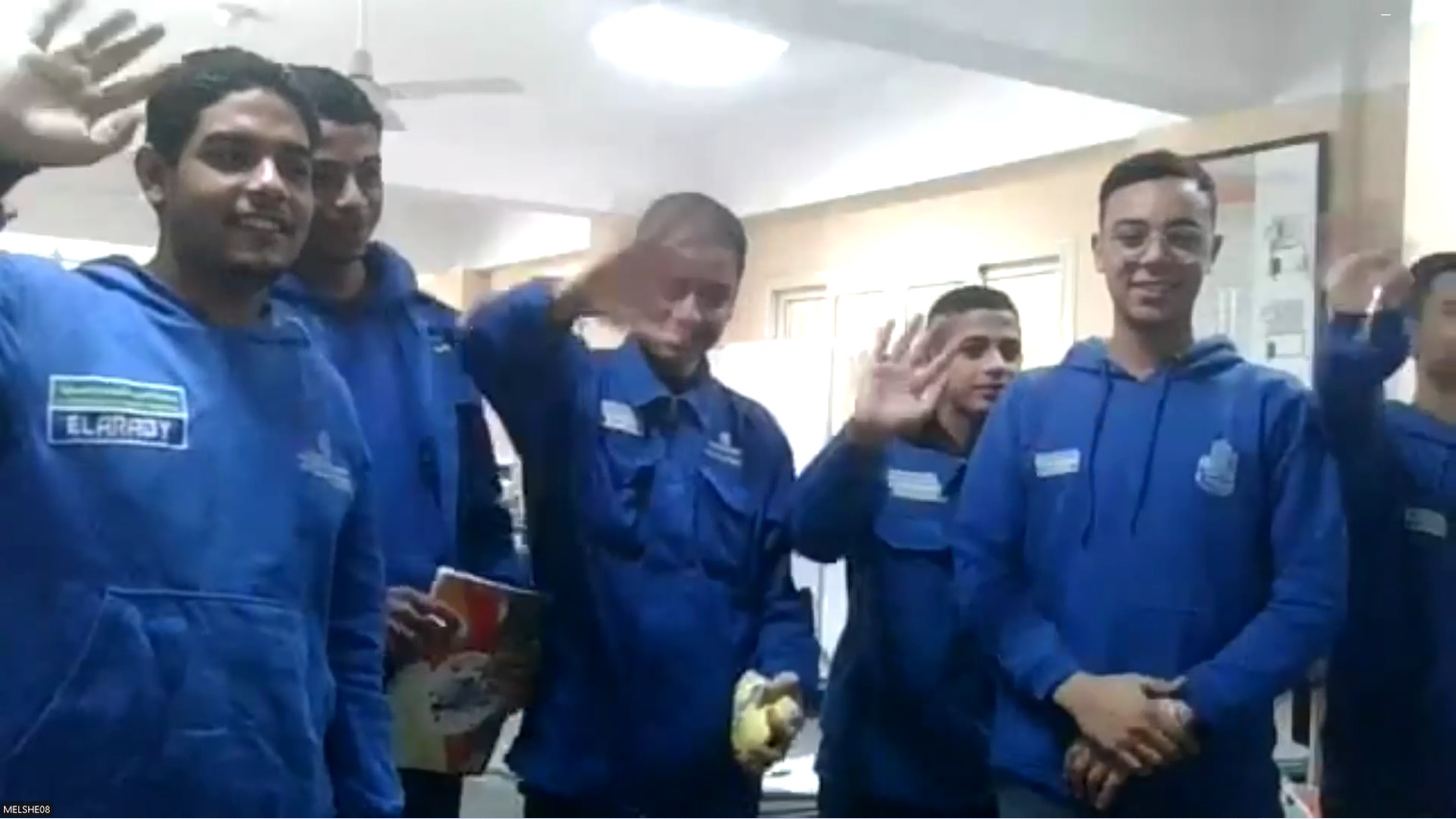 Exciting right until the end
Exciting right until the end
Summary
This interaction event was held after the students had learned about Egypt from a Japanese perspective and about Japan’s position in the international community. During the session, the popular Janken game served as a great icebreaker, instantly bringing the students closer together and leading to a very lively exchange of ideas. The excitement likely stemmed from the fact that, despite being from different countries, they were able to empathize with each other as fellow students learning the same technology and living on the same planet. By finding common ground while respecting each other’s differences, they were able to interact on a deeper level. This experience will undoubtedly serve as a valuable asset for future international exchange.
Through this event, Joto Technology High School students learned that while the internet makes it easy to connect with the world, friendly international exchange is not possible without understanding the language and cultural differences of the other country. The experience of overcoming differences as well as “getting through” and “being understood” will be a great asset for Japanese technology high school students, for whom a global perspective is important.
Through this experience of interaction with El Araby High School, Joto Technology High School aims to contribute to the achievement of Goal 8 (Promote sustained, inclusive and sustainable economic growth, full and productive employment and decent work for all) and Goal 9 (Build resilient infrastructure, promote inclusive and sustainable industrialization and foster innovation) of the Sustainable Development Goals (SDGs).







